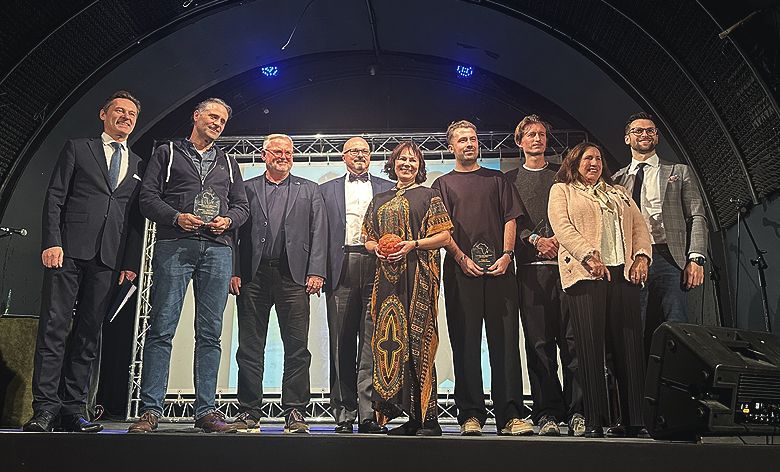Cameroon. Harambee's Project Promotes Family Farming to Cope with the Global Economic Crisis.
Approximately 54% of Africa's working population depends on the agricultural sector for their livelihoods, especially family farming activities. Agriculture not only feeds families, but also provides jobs and promotes the growth of the rural economy and development. Estimates (FAO) indicate that, in Africa, up to 12 million new jobs will have to be created per year over the next 20 years to absorb the new workforce entering the workforce. Agriculture can generate employment, but it is necessary to attract young people and modernize.
Harambee has been supporting Family Agricultural Schools in Cameroon for several years, which involve the entire family in the training process, alternating school and work, thus focusing on the family farming model and adapting educational needs to the need to keep up with the times.
"Making work in the fields attractive to young people also means reducing south-south migratory flows with often uncertain outcomes," says Pellyang Ndoumo, 48, from Doukoula in the Far North region of the country. "I am married and father of five children. I inherited a love of farming from my parents."
Pellyang started farming at a very young age and then producing while still in high school. "In 1988, I established my first cassava field on an area of 1.5 hectares, which was a good source of entry for me," then he attended a vocational technical school, where he graduated in 2000 as an agricultural technician. That same year, he joined the Ecole Familiale Agricole (EFA) in Doukoula as a trainer, then supervisor of trainers. His camps serve as a model for his students and, above all, his personal experience sets an example for a generation of young people looking for professional outlets.
"I followed eleven training modules in the pedagogy of work-study alternation organized by the National Coordination of Family Agricultural Schools of Cameroon (CNEFAC). Since then, training youth and families has become my passion."
Every farmer knows that when their sons or daughters go to the city to look for work, three threats loom large: the end of family farming activities, the desertification of the village, and - often - returning home without any kind of education or vocational training.
Family Farming Schools were thus born out of a concern shared by many farmers, namely to provide their children with a trade and education that would allow them to make a decent living from farming and find a place in the modern world.
Pellyang -who is now the regional coordinator for EFAs in the North- is a relentless trainer who doesn't hesitate to get out in the field to accompany his students and their families in any weather (oppressive heat, dust, rain, muddy roads, ...). "He is always ready to respond and works beyond his scheduled hours to help EFA associations. He supervises and accompanies the associations, analyzes the training needs of trainers and families, and proposes actions to the associations to make them more dynamic"; he guides and sensitizes the associations on measures to combat COVID-19 and compliance with the measures recommended by the Cameroonian government. He also promotes the new EFAs to the local authorities.
 "My desire is to see our agriculture grow, adapting it to modern times. And it gives me so much satisfaction to particularly accompany the women, to see their activities blossom thanks to the training they receive; this has a major impact on the life of each family and therefore of the entire community."
One of the merits of these unique schools is that they firmly address one of the aspects that determine the development of agriculture in Africa: training.
HELP US SUPPORT the strengthening of family agriculture in the Fokamezo and Kolara regions of Cameroon. Click here for information on the project.
"My desire is to see our agriculture grow, adapting it to modern times. And it gives me so much satisfaction to particularly accompany the women, to see their activities blossom thanks to the training they receive; this has a major impact on the life of each family and therefore of the entire community."
One of the merits of these unique schools is that they firmly address one of the aspects that determine the development of agriculture in Africa: training.
HELP US SUPPORT the strengthening of family agriculture in the Fokamezo and Kolara regions of Cameroon. Click here for information on the project.
 "My desire is to see our agriculture grow, adapting it to modern times. And it gives me so much satisfaction to particularly accompany the women, to see their activities blossom thanks to the training they receive; this has a major impact on the life of each family and therefore of the entire community."
One of the merits of these unique schools is that they firmly address one of the aspects that determine the development of agriculture in Africa: training.
HELP US SUPPORT the strengthening of family agriculture in the Fokamezo and Kolara regions of Cameroon. Click here for information on the project.
"My desire is to see our agriculture grow, adapting it to modern times. And it gives me so much satisfaction to particularly accompany the women, to see their activities blossom thanks to the training they receive; this has a major impact on the life of each family and therefore of the entire community."
One of the merits of these unique schools is that they firmly address one of the aspects that determine the development of agriculture in Africa: training.
HELP US SUPPORT the strengthening of family agriculture in the Fokamezo and Kolara regions of Cameroon. Click here for information on the project.






